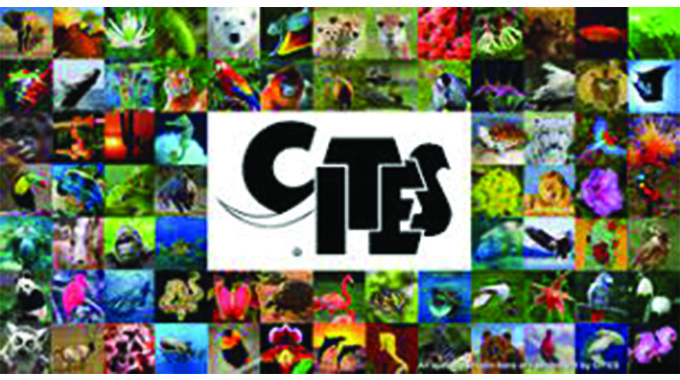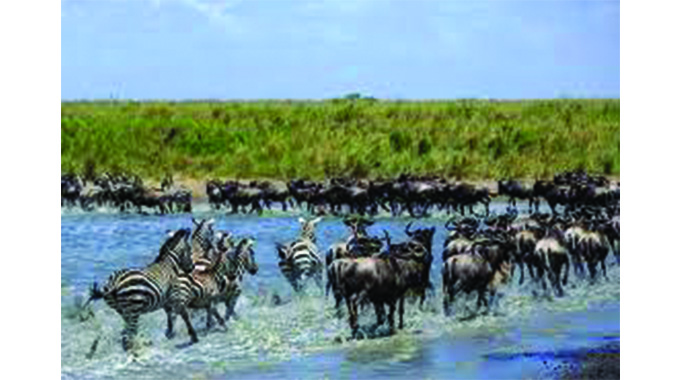
Jumbo states push for sale of ivory stockpiles
Chronicle
Leonard Necube and Robin Muchetu in Hwange
The African Elephant Conference concluded in Hwange yesterday, with range states reiterating their demand to allow the sale of ivory stocks so that they can fully benefit from their conservation efforts.
The theme in the four-day conference of range states, which are home to elephants, was the participation of communities in sustainable elephant conservation at the national, regional and international levels.

Initially 19 range states were expected to participate in the conference, but only six participated.
Ministers of Zimbabwe, Zambia, Tanzania, Namibia and Botswana made the Hwange declaration at the end of a meeting of ministers yesterday, which was also ratified by South Africa, which also sent a delegation of experts to the four-day conference.
They resolved to reaffirm the objectives of the African Union to achieve greater unity and solidarity in Africa, promoting and defending African common positions on issues of interest enshrined in Article 3 of the Continental Body’s Constitution Act.
The convention sought to come together with a united voice against the Convention on International Trade in Endangered Species of Wild Fauna and Flora (CITES) on the trade in ivory by placing countries on Appendix 1.
The conference was in preparation for the CITES COP19 to be held in Panama in November.
The range states reminded CITES that they have a sovereign right to manage their wildlife resources and have a responsibility to sustainably use and protect their resources.

He warned the international body not to interfere with domestic trade, the sovereignty of states and their rights to sustainable use of wildlife.
“We Ministers Responsible for Environment, Wildlife and Tourism on Major African Elephant Range States have gathered in Hwange Zimbabwe on 26 May 2022 with local and international organizations, key groups, communities and stakeholders to create a new and Better deals for elephant conservation, tourism and rural communities in major African range states.
“In view of the various international restrictions being imposed by international organizations and states on sustainable trade in wildlife and wildlife products, we resolve to develop functional community-based natural resource management policies and legislation that benefit communities more than the costs of management. allow to receive,” reads part of the Hwange announcement, the contents of which were also included in the release.
Member States agreed to protect the status of the African elephant and prevent illegal trade, while taking into account the viability of wildlife resources in Africa, requiring collective and cooperative action by all major African states.
They agreed to adopt sustainable elephant management strategies to reduce human-elephant conflicts and create accurate information to be provided in CITES on the cost of living with wildlife.
“Therefore we reaffirm our commitment to the principle of sustainable use, generate revenue through the sale of wildlife products by developing a viable tool that enables our countries to sell ivory reserves to raise funds for conservation Leverages Transfrontier Conservation Area (TFCA) strategies and approaches for coordinated transboundary management to conserve nearshore elephant populations on the continent, develop innovative mechanisms to resource existing trust funds to promote biodiversity and wildlife Allocating resources for socio-ecological research in management, reducing illegal off-take and trade through enhanced enforcement,” read the Hwange Declaration document.
He stressed the importance of Africa to speak with a unified voice at the international level and called for the establishment of a mechanism to advocate on common issues.
He said the global African elephant population is declining, elephant numbers in southern Africa are increasing, good conservation practices must be demonstrated that should be recognized and lessons should be provided for other countries to emulate.
“So countries with high elephant populations should be heard and heard, and should benefit from their efforts in conserving their elephants.
The conference agreed that the voices of communities that coexist with wildlife should be included in decision-making as they bear the brunt of living with wildlife,” read the ministers’ release.
 wildlife
wildlifeWildlife conservation requires long-term funding from a variety of sources, including but not limited to the wildlife trade.
“Animal welfare organizations should not only oppose conservation philosophy in major category states but also fund wildlife conservation.
Instead, the convention agreed that elephant range states should not be penalized for their efforts to conserve the species, but should be appreciated and supported by the international community for their good management practices. Told.
The conference agreed that current CITES decisions are no longer scientific but based on votes and sentiment.
It was agreed that the convention needed to be reviewed and ensured that it fulfills its intended purpose.
“Decisions should be made based on the number of elephants in each country or region to curb the prevailing practice where decisions are effected by non-affected nations.
We urge all African states to support and commit to this declaration to a new and better deal for elephant conservation, tourism and rural communities in major African range states,” he said.
— @ncubeleon, @NyembeziMu.

